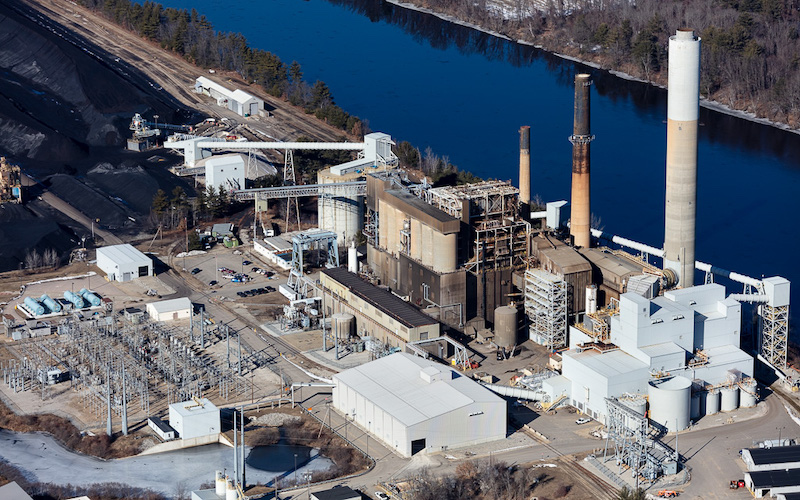
The Merrimack Station coal plant sits on the banks of the Merrimack River in New Hampshire.
Today, we’re celebrating some good news: As part of an agreement to resolve a lawsuit brought by CLF and the Sierra Club, Granite Shore Power has agreed to shutter New England’s last two coal-fired power plants. New Hampshire’s Merrimack Station in Bow will close by June 1, 2028, and potentially one year earlier than that. Schiller Station in Portsmouth, which hasn’t operated in recent years, will shut down its coal-fired boilers no later than December 31, 2025. With the closure of these outdated, polluting plants, New England moves decisively into an age of clean energy, becoming the country’s second entirely coal-free region. Thanks to CLF’s decades-long campaign to halt this dangerous and obsolete fuel, New Hampshire residents can breathe a little easier.
But while we’re thrilled to see New England move away from outmoded fossil fuels, our work doesn’t stop at the closing of these two coal plants. Now is the moment for New Hampshire to join other New England states in adopting a climate law. With the closure of the power plants and the recent passing of a food waste law that will cut climate pollution from landfills, New Hampshire can and must seize the momentum to join the rest of New England in becoming a climate leader.
A Long-Awaited Victory Is a Beginning
We’ve fought long and hard for the end of coal in New England and New Hampshire. As the dirtiest of the fossil fuels, coal is a major source of climate pollution. Relying on a fuel used to heat homes in the 1880s makes no sense.
What’s more, the pollution from coal plants causes a wide range of health issues, including heart attacks, asthma, developmental delays in infants and children, hospitalizations, and even premature deaths. Recent studies show that the health risks of coal-fired plants have been underestimated. Researchers have discovered that exposure to fine particulate air pollution from coal-fired plants is associated with a mortality risk 2.1 times greater than particle pollution from other sources. Communities living near these power plants have borne these health costs. Soon, that will no longer be the case.
The Next Steps Toward Clean Energy
As these health risks came to light, and as emissions from coal plants were definitively linked to climate change, fossil fuel companies started promoting “natural gas” as a cleaner alternative. But there’s nothing “natural” about this fossil fuel; it’s gas and is not a solution. It’s just as damaging to our climate as coal (in some ways, more so). In 2020, according to the U.S. Environmental Protection Agency, gas and petroleum, as well as abandoned oil and gas wells, accounted for about 33% of the country’s total methane emissions. Researchers have also discovered massive amounts of methane leaking from gas facilities worldwide. Gas-fired power plants pollute our atmosphere, and in our homes, gas emits hazardous pollutants that can lead to asthma and other respiratory problems.
In short, gas is far from a solution, either as a replacement for coal or as a “bridge” or “transitional” fuel to clean energy. That’s why CLF is fighting to bypass gas and move directly to true clean energy solutions like solar and wind power. They don’t pollute the air, and they don’t overheat our planet.
Seizing the Momentum
Here at CLF, we’ve studied what needs to be done to propel us toward clean energy. We must develop more wind and solar power across our region and build an electricity grid ready to handle the increased electricity required to power our cars, appliances, and more. New Hampshire must update its outdated Climate Action Plan. And it must back that plan up with a climate law that ensures the greenhouse gas reductions necessary to address the climate crisis.
Already, Granite Staters are having to hunker down under a quickening pace of extreme storms, floods, and heat. Not long ago, we saw electricity prices double for a period of time because of reliance on expensive fossil fuels rather than cheaper wind and solar power. New Hampshire is falling behind on advancing clean, affordable electricity – yet without decisive action from state leaders, we risk losing the very things we love most about living here.
Yes, we’re celebrating a victory. We’re happy to say goodbye to coal. But we’ll continue pushing for what we know is right: leaving fossil fuels behind where they belong. It’s time to embrace clean wind and solar for the sake of our children and grandchildren – now.



